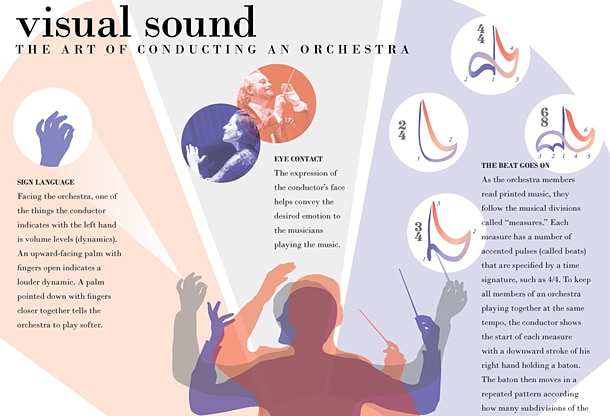ILL 210: Technical Illustration and Infographics
Data representation and information design for illustrators
Information design is the practice of creating visual presentations that communicate information for the purpose of instruction. In this online infographics course, you'll explore approaches and concepts in technical illustration and infographics. Working with a skilled illustrator, you'll learn methods for creating instructional illustrations that communicate clearly and effectively.
 Student work by Melissa Morley.
Student work by Melissa Morley. Visit the Student Gallery.
About This Course
Project-Based Learning
Illustration projects requiring data visualization include a range of infographics touching on politics, music, science, and instructional design.
What Skills Will I Develop?
Students in this course can expect to learn to:
- Produce a series of infographics that are easily understood, accurate, and creative.
- Create effective, well-designed, attractive graphs in Adobe Illustrator, with consistency in style.
- Construct data visualizations that are easily understood, accurate, and creative.
- Render effective and attractive presentations combining illustrations and words.
- Create illustrations with at least one human figure in a relevant style.
- Apply an understanding of the principles of abstraction, visual hierarchies, and iconography in your work.
- Apply an understanding of the principles of structure, spacial relationships, and scale in your work.
- Produce effective and attractive infographics that combine illustrations and words to explain a process.
- Apply an understanding of the principles of narrative in your work.
What Software and Supplies Do I Need?
- Computer with Internet connection.
- Adobe Illustrator CC.
- Basic experience in drawing and the above software.
Course Outline
The Illustration of Information
What is information design, and what makes it successful or unsuccessful? In this first lecture you'll learn principles for information design: efficiency and clarity.
Visualizing Data
Data are numbers that record our activity and identities in real life. They detail how we live, how we die, how we eat, how we love, and so many other endeavors. Here we'll explore the conventions of common graphical forms.
Clarifying Visual Information
In this lecture, you're going to learn about various methods to focus the viewer's attention on what is important. We can make the most stunning infographic in the world, but if the viewer isn't actually seeing the pertinent information, our infographic turns back into a regular graphic.
Structure, Spatial Relationships, and Scale
When a reader needs to understand a complicated structure or the layout of an area, a visual diagram works best. In this lecture, you'll learn the basics of making visual diagrams, exploring strategies for revealing structure, showing interiors, depicting details, and rendering scale.
Teaching a Process
Showing a process with infographics puts a temporal sequence of events into one that is arranged spatially. In this lecture, you're going to learn how to use make these kinds of infographics that teach procedures clearly and effectively.
Illustrating Narrative
When we make infographics and technical illustrations, the reality is that we integrate all of these components to explain different kinds of information. In this final lecture we will deal with principles for building narrative infographics and peek at the future of technical illustration.
Frequently Asked Questions (FAQ)
Who Are The Instructors?
Our courses are developed and taught by our faculty of professional artists, designers, and photographers. This means that you’ll learn in-demand skills, get feedback on your work, and build a portfolio of creative work.
How Do The Courses Work?
Our courses are project-based. In each course you’ll enjoy a series of lectures, projects, discussions, and critiques designed to stretch your creative skills, earning college credit for your completed course.
When Do Courses Start?
Classes start January, April, and August, and this course can be completed in a 15-week term. College credit from this course can be applied to a range of degree and certificate level programs at Sessions College.
Is Sessions College accredited?
Yes. Since 2001, Sessions College has been accredited by the Distance Education Accrediting Commission (DEAC). The Distance Education Accrediting Commission is listed by the U.S. Department of Education as a recognized accrediting agency and is recognized by the Council for Higher Education Accreditation (CHEA).
